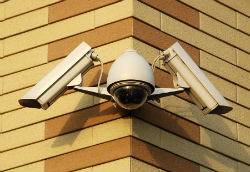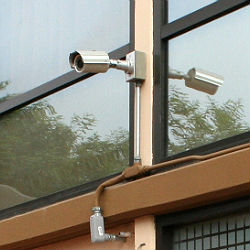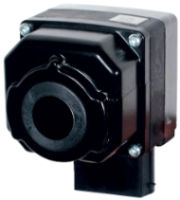Wide Coverage: Problems and Solutions for Securing Large Areas
December 6th, 2023
Let's look at three main wide coverage options for Atlanta, GA, as well as peripheral devices and physical measures that can be undertaken to enhance each of these.
1. Megapixel Imaging
A long-held desire of surveillance users in Atlanta, GA and the industry alike, is for a camera that can see wide and telephoto at the same time. Now, that tool has arrived in the form of megapixel cameras.
Because of this capability, many regard it as the number one choice for securing large areas in Atlanta, GA.
Megapixel cameras are like a digital still photography camera, and feature a very high resolution with millions and millions of pixels. Such a high resolution enables any part of an image to be magnified many times to highlight minute details. Unlike digital cameras, megapixel cameras continuously take multiple images per second and are designed to do so 24/7, year after year.
The imaging capabilities of megapixel cameras make them ideal for covering large areas in Atlanta, GA such as parking lots, prison yards, and hallways. Live or recorded video from megapixel cameras allows the user to digitally pan/tilt/zoom to inspect suspicious activity.
In applications where the surveillance footage will not be monitored in real-time, this ability is especially useful to gather crucial evidence.
Megapixel camera: wide angle view
Megapixel camera: close-up view
2. PTZ (Pan/Tilt/Zoom)
PTZ cameras combine the benefits of a camera equipped with high powered, motorized optics and the ability to traverse up/down and side-to-side. For manned surveillance, these benefits allow operators to cover large areas in Atlanta, GA and easily explore suspicious activities. For unmanned surveillance, PTZ cameras can be programmed to patrol hot spots automatically.
In times past, the price tag of PTZs has limited their use to large corporations and government agencies able to afford them. Today, however, the price has dramatically dropped and technology has dramatically increased.
Some of the typical features found in today's PTZ cameras are:
- Digital signal processing to handle harsh lighting and to produce low noise images
- Sensitive low light imagers
- Built-in infrared
- Privacy masking
- 360° pan
- High speed motors

PTZ and dome camera combination
Along with the cameras themselves, housing and mounting options have improved. Housing options include indoor, outdoor, heating and blower units. Mounting options vary greatly but include pole mounts, wall mounts, ceiling mounts and drop mounts.
Additionally, mounting threads follow industry standards which allows for easy field-produced customization.
3. Conventional Cameras
Although megapixel and PTZ cameras are now the primary cameras of choice for covering wide areas, fixed cameras still have a place in a comprehensive surveillance system.
For instance, in tandem with PTZs, fixed cameras can be trained on likely avenues of approach such as gates, parking lot entrances, and corridors. So no matter where other cameras are positioned, identification of who and what is coming and going is always documented.
Fixed cameras such as CS mount cameras allow for customization to meet special needs. As an example, most cameras with built-in optics are designed to meet short to medium-range needs. To cover a gate, say, 1,500 feet away will require a special telephoto lens that only CS mount cameras will accept. There are thousands of different lens and camera combinations to meet long range needs.

IR bullet camera
Additionally, fixed cameras such as bullet cameras are available with built-in long range infrared for night time use. Viewing distances up to several hundred feet in the dark is entirely possible and ensures surveillance 24/7.
Peripheral Devices
Regardless of the camera option or combination of options used to meet your wide coverage needs, peripheral devices are available that will greatly improve reaction times to undesired activities and ease review of video evidence.
A. Video Analytics
The latest aid to video surveillance systems is analytics. Video analytics devices are essentially micro-computers that watch the video for you and notify you of suspicious activity.
Activities in question could be: individuals crossing a virtual tripwire drawn by the user, loitering, items left (suitcases, backpacks, boxes), and items taken. Many of these devices also provide a people counting function which determines how many people entered an area and then left.
Most detection functions can also be set to only be active for a specific period of time and/or days. Using the people counting function, any count greater than zero after 11 p.m. could be considered suspicious activity. Once the device has detected activity, it can send emails or text alerts, or alarm outputs can be used to trigger a range of devices such as lights, sirens, and lift arms.
B. Sensors
Security sensors have been around for many decades and most pre-date video surveillance technology. However, they are very reliable and inexpensive, and are built for specific purposes with a wide variety available. Some of the more frequently employed devices are:
- PIR (Passive Infrared)
- Microwave
- Magnetic (Detection of vehicles)
- Seismic
One thing these devices have in common is an alarm output, which can easily be integrated into surveillance cameras and systems. A very common integration is linking one or more PIR sensors to PTZ cameras. PTZ cameras with alarm inputs can be programmed to instantly react to an alarm signal by repositioning itself to the area of concern.
Simple integrations like this are easy to do, multiply the camera capability and help to ensure a proper video record.
C. Thermal Imagers

PathFindIR thermal imaging camera system
Thermal imagers aren't just for the local SWAT team. They also make fantastic companions for a video surveillance system and are perfect for use with video analytics.
Why? For starters, thermal cameras are not affected by light. So whether it's day or night, the image will remain relatively the same which is ideal for computer analysis.
In addition, thermal imagers are less effected by inclement weather such as rain and fog. Lastly, because they are detecting heat versus light, at a glance it will be easy to spot both people and vehicles even when viewing a wide area.
Although thermal imagers offer unique benefits, power requirements and video signals are identical to video-based surveillance cameras. Thanks to their increasing popularity, thermal cameras are available in a wide variety of forms including fixed cameras, indoor/outdoor and PTZ combinations that have both a video and a thermal camera built into one unit.
Physical Measures
A security plan should not consist of technology alone, it should also be supported by physical measures. Considering the topic of covering wide areas, there are some simple tactics that will make a key difference in providing results and in some cases reduce the gear needed.
At the root of all tactics, is funneling traffic to specific points in order to reduce the areas on which cameras need to be trained.
In most buildings, this funneling to specific points has already been done by doors. However, for wide, porous areas such parking lots, open fields and larger interior venues, it's a different story.
Obviously, chain link fences or concrete walls could provide choke points but that would be costly and if you need them, you probably already have them.
Something to consider when choosing an effective but low cost option is how people go out of their way to take the easiest perceived route, take the smoothest route or take the route that seems proper. Banking on peoples habits, choke points could be added to a large field by planting shrubbery on the perimeter, leaving specific points free for traffic.
In the case of a parking lot, low curbs of asphalt, signs indicating entrances and exits, and painted lanes are all things that prompt people to take specific routes. These practices are subtle but they do work. When you're going about your daily routine, start studying establishments and I think you'll be surprised at how many properties funnel traffic all the time.



